Reflection on AHPRA Registered Nurse Standards in Clinical Practice
VerifiedAdded on 2023/06/04
|8
|1892
|128
Essay
AI Summary
This essay provides a detailed reflection on two AHPRA Registered Nurse Standards of Practice: Thinks Critically and Analyses Nursing Practice, and Engages In Therapeutic and Professional Relationships. The reflection draws upon the author's undergraduate nursing clinical practice experiences, highlighting the importance of critical thinking, evidence-based practice, and therapeutic relationships in providing holistic patient care, particularly in the context of Aboriginal and Torres Strait Islander patients. The author discusses specific instances where they applied these standards, emphasizing the need for cultural sensitivity, ethical conduct, and collaboration with other healthcare professionals. The essay concludes by reaffirming the author's commitment to upholding these standards as they transition into a fully registered nurse role, underscoring their significance in promoting quality and safe healthcare.
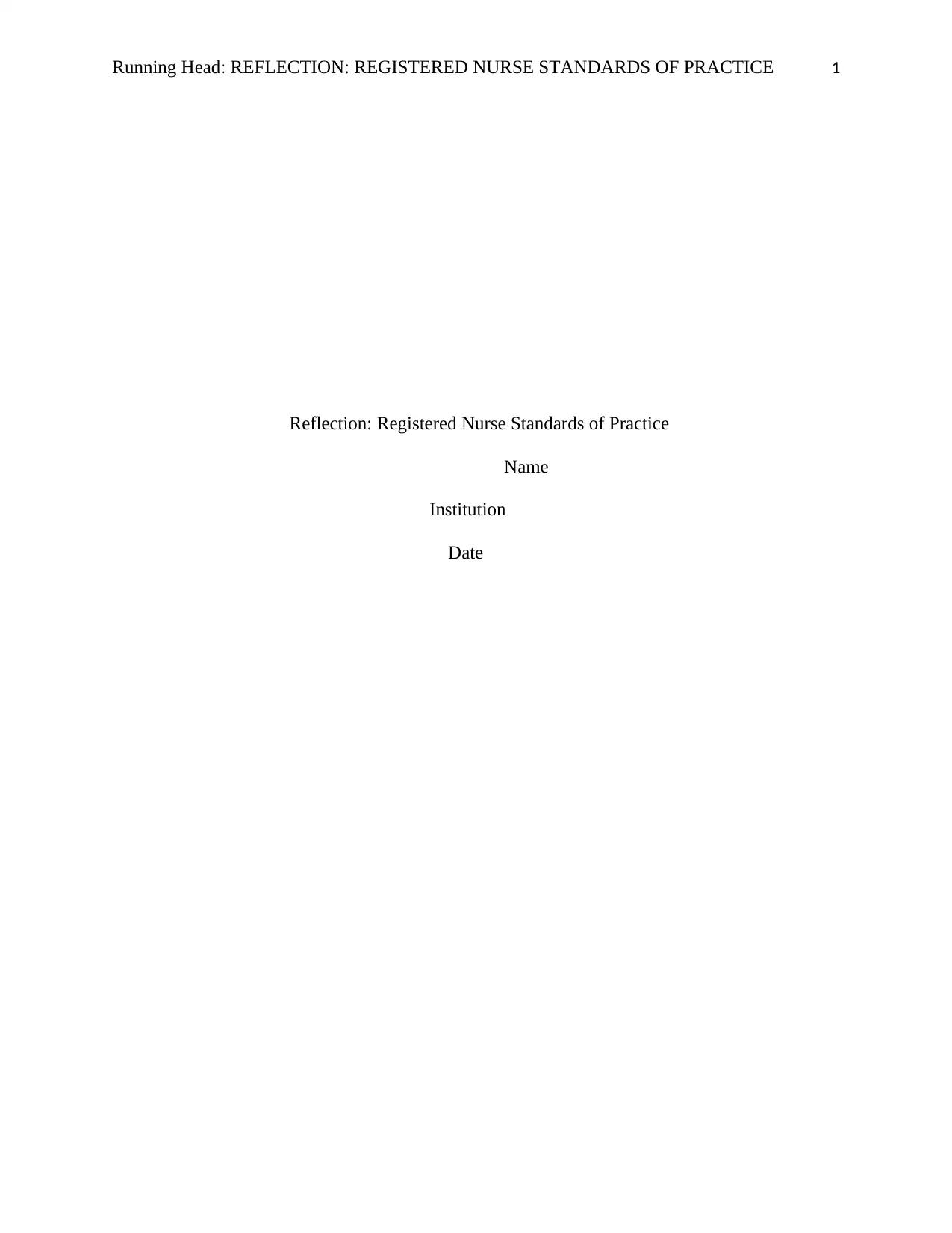
Running Head: REFLECTION: REGISTERED NURSE STANDARDS OF PRACTICE 1
Reflection: Registered Nurse Standards of Practice
Name
Institution
Date
Reflection: Registered Nurse Standards of Practice
Name
Institution
Date
Paraphrase This Document
Need a fresh take? Get an instant paraphrase of this document with our AI Paraphraser
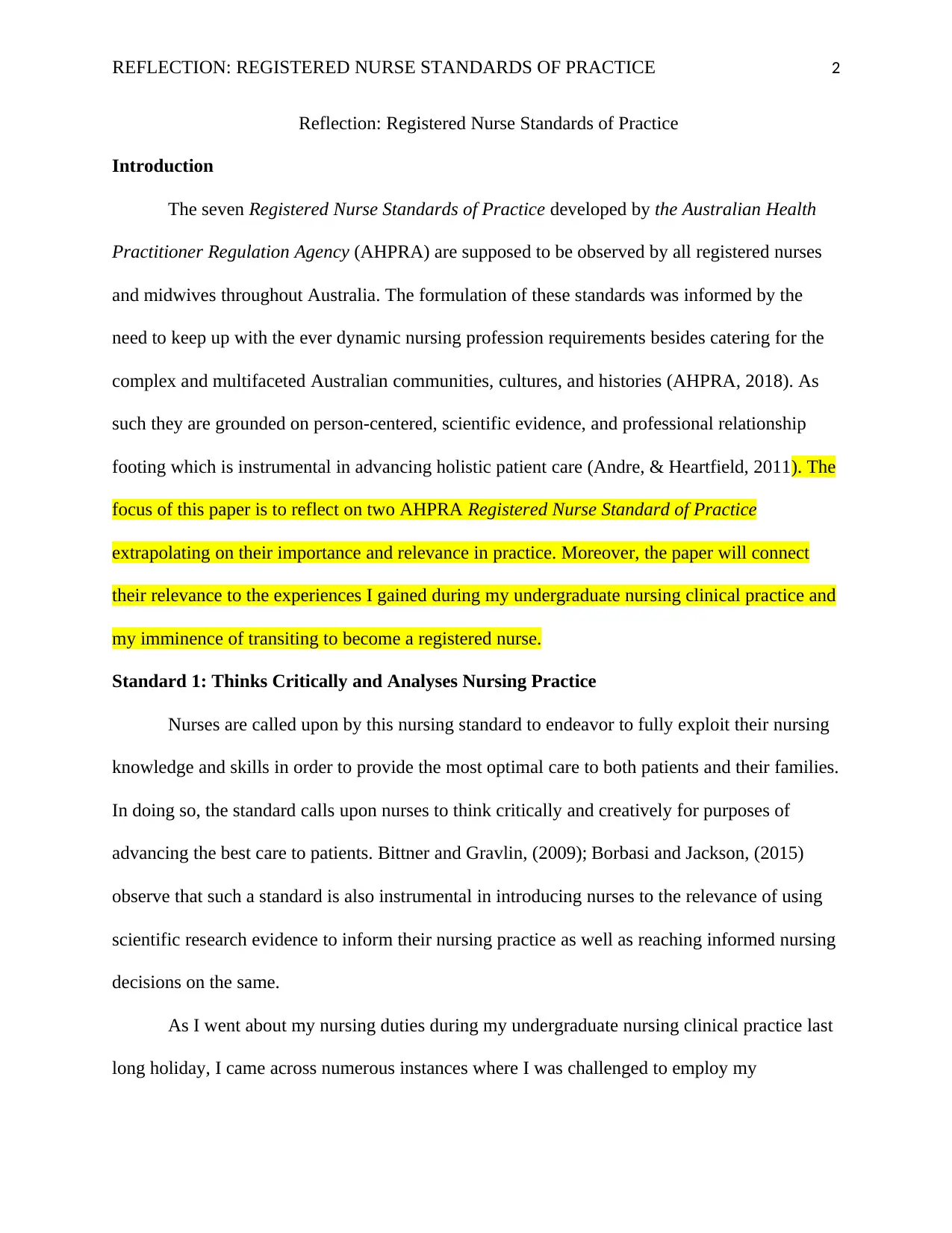
REFLECTION: REGISTERED NURSE STANDARDS OF PRACTICE 2
Reflection: Registered Nurse Standards of Practice
Introduction
The seven Registered Nurse Standards of Practice developed by the Australian Health
Practitioner Regulation Agency (AHPRA) are supposed to be observed by all registered nurses
and midwives throughout Australia. The formulation of these standards was informed by the
need to keep up with the ever dynamic nursing profession requirements besides catering for the
complex and multifaceted Australian communities, cultures, and histories (AHPRA, 2018). As
such they are grounded on person-centered, scientific evidence, and professional relationship
footing which is instrumental in advancing holistic patient care (Andre, & Heartfield, 2011). The
focus of this paper is to reflect on two AHPRA Registered Nurse Standard of Practice
extrapolating on their importance and relevance in practice. Moreover, the paper will connect
their relevance to the experiences I gained during my undergraduate nursing clinical practice and
my imminence of transiting to become a registered nurse.
Standard 1: Thinks Critically and Analyses Nursing Practice
Nurses are called upon by this nursing standard to endeavor to fully exploit their nursing
knowledge and skills in order to provide the most optimal care to both patients and their families.
In doing so, the standard calls upon nurses to think critically and creatively for purposes of
advancing the best care to patients. Bittner and Gravlin, (2009); Borbasi and Jackson, (2015)
observe that such a standard is also instrumental in introducing nurses to the relevance of using
scientific research evidence to inform their nursing practice as well as reaching informed nursing
decisions on the same.
As I went about my nursing duties during my undergraduate nursing clinical practice last
long holiday, I came across numerous instances where I was challenged to employ my
Reflection: Registered Nurse Standards of Practice
Introduction
The seven Registered Nurse Standards of Practice developed by the Australian Health
Practitioner Regulation Agency (AHPRA) are supposed to be observed by all registered nurses
and midwives throughout Australia. The formulation of these standards was informed by the
need to keep up with the ever dynamic nursing profession requirements besides catering for the
complex and multifaceted Australian communities, cultures, and histories (AHPRA, 2018). As
such they are grounded on person-centered, scientific evidence, and professional relationship
footing which is instrumental in advancing holistic patient care (Andre, & Heartfield, 2011). The
focus of this paper is to reflect on two AHPRA Registered Nurse Standard of Practice
extrapolating on their importance and relevance in practice. Moreover, the paper will connect
their relevance to the experiences I gained during my undergraduate nursing clinical practice and
my imminence of transiting to become a registered nurse.
Standard 1: Thinks Critically and Analyses Nursing Practice
Nurses are called upon by this nursing standard to endeavor to fully exploit their nursing
knowledge and skills in order to provide the most optimal care to both patients and their families.
In doing so, the standard calls upon nurses to think critically and creatively for purposes of
advancing the best care to patients. Bittner and Gravlin, (2009); Borbasi and Jackson, (2015)
observe that such a standard is also instrumental in introducing nurses to the relevance of using
scientific research evidence to inform their nursing practice as well as reaching informed nursing
decisions on the same.
As I went about my nursing duties during my undergraduate nursing clinical practice last
long holiday, I came across numerous instances where I was challenged to employ my
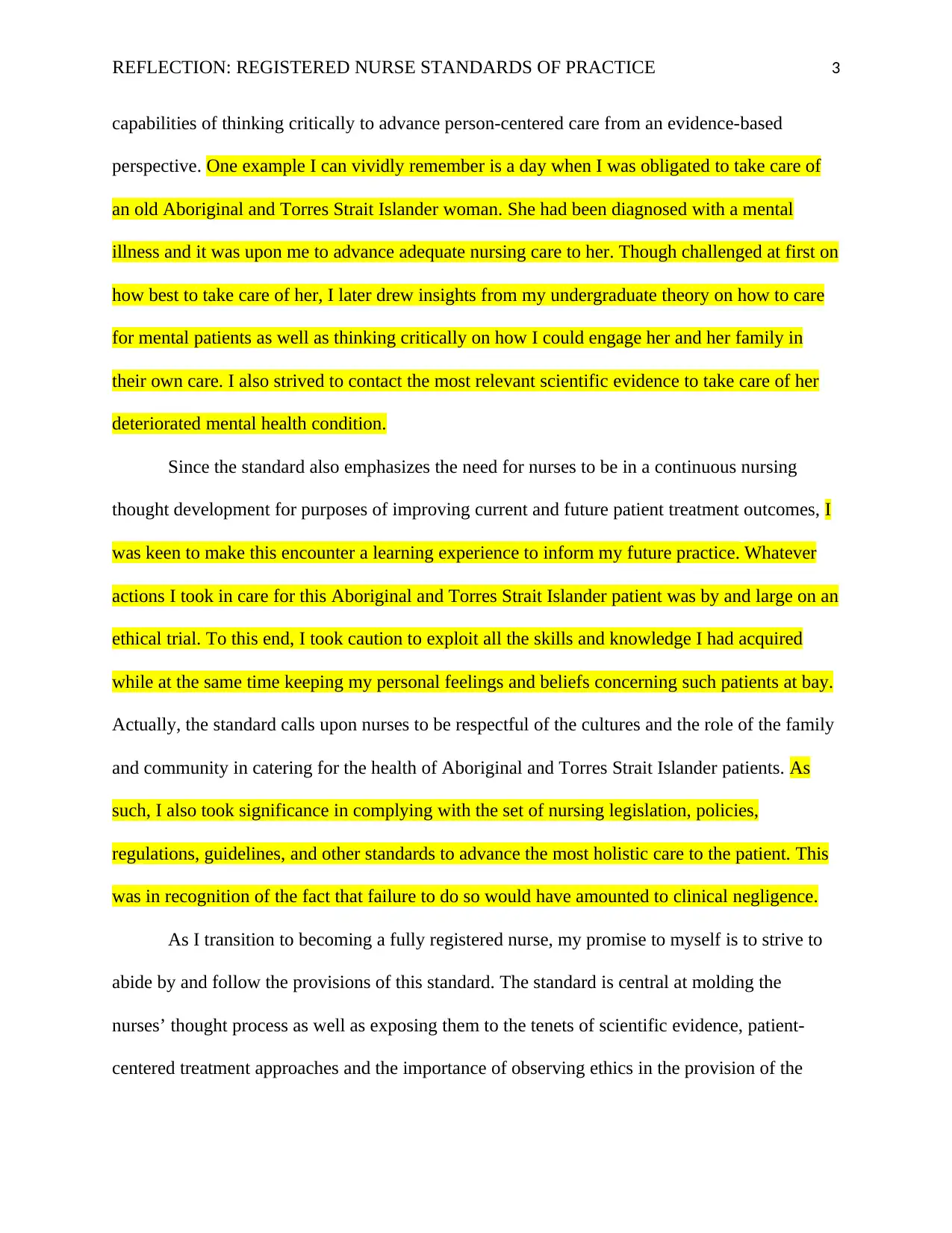
REFLECTION: REGISTERED NURSE STANDARDS OF PRACTICE 3
capabilities of thinking critically to advance person-centered care from an evidence-based
perspective. One example I can vividly remember is a day when I was obligated to take care of
an old Aboriginal and Torres Strait Islander woman. She had been diagnosed with a mental
illness and it was upon me to advance adequate nursing care to her. Though challenged at first on
how best to take care of her, I later drew insights from my undergraduate theory on how to care
for mental patients as well as thinking critically on how I could engage her and her family in
their own care. I also strived to contact the most relevant scientific evidence to take care of her
deteriorated mental health condition.
Since the standard also emphasizes the need for nurses to be in a continuous nursing
thought development for purposes of improving current and future patient treatment outcomes, I
was keen to make this encounter a learning experience to inform my future practice. Whatever
actions I took in care for this Aboriginal and Torres Strait Islander patient was by and large on an
ethical trial. To this end, I took caution to exploit all the skills and knowledge I had acquired
while at the same time keeping my personal feelings and beliefs concerning such patients at bay.
Actually, the standard calls upon nurses to be respectful of the cultures and the role of the family
and community in catering for the health of Aboriginal and Torres Strait Islander patients. As
such, I also took significance in complying with the set of nursing legislation, policies,
regulations, guidelines, and other standards to advance the most holistic care to the patient. This
was in recognition of the fact that failure to do so would have amounted to clinical negligence.
As I transition to becoming a fully registered nurse, my promise to myself is to strive to
abide by and follow the provisions of this standard. The standard is central at molding the
nurses’ thought process as well as exposing them to the tenets of scientific evidence, patient-
centered treatment approaches and the importance of observing ethics in the provision of the
capabilities of thinking critically to advance person-centered care from an evidence-based
perspective. One example I can vividly remember is a day when I was obligated to take care of
an old Aboriginal and Torres Strait Islander woman. She had been diagnosed with a mental
illness and it was upon me to advance adequate nursing care to her. Though challenged at first on
how best to take care of her, I later drew insights from my undergraduate theory on how to care
for mental patients as well as thinking critically on how I could engage her and her family in
their own care. I also strived to contact the most relevant scientific evidence to take care of her
deteriorated mental health condition.
Since the standard also emphasizes the need for nurses to be in a continuous nursing
thought development for purposes of improving current and future patient treatment outcomes, I
was keen to make this encounter a learning experience to inform my future practice. Whatever
actions I took in care for this Aboriginal and Torres Strait Islander patient was by and large on an
ethical trial. To this end, I took caution to exploit all the skills and knowledge I had acquired
while at the same time keeping my personal feelings and beliefs concerning such patients at bay.
Actually, the standard calls upon nurses to be respectful of the cultures and the role of the family
and community in catering for the health of Aboriginal and Torres Strait Islander patients. As
such, I also took significance in complying with the set of nursing legislation, policies,
regulations, guidelines, and other standards to advance the most holistic care to the patient. This
was in recognition of the fact that failure to do so would have amounted to clinical negligence.
As I transition to becoming a fully registered nurse, my promise to myself is to strive to
abide by and follow the provisions of this standard. The standard is central at molding the
nurses’ thought process as well as exposing them to the tenets of scientific evidence, patient-
centered treatment approaches and the importance of observing ethics in the provision of the
⊘ This is a preview!⊘
Do you want full access?
Subscribe today to unlock all pages.

Trusted by 1+ million students worldwide
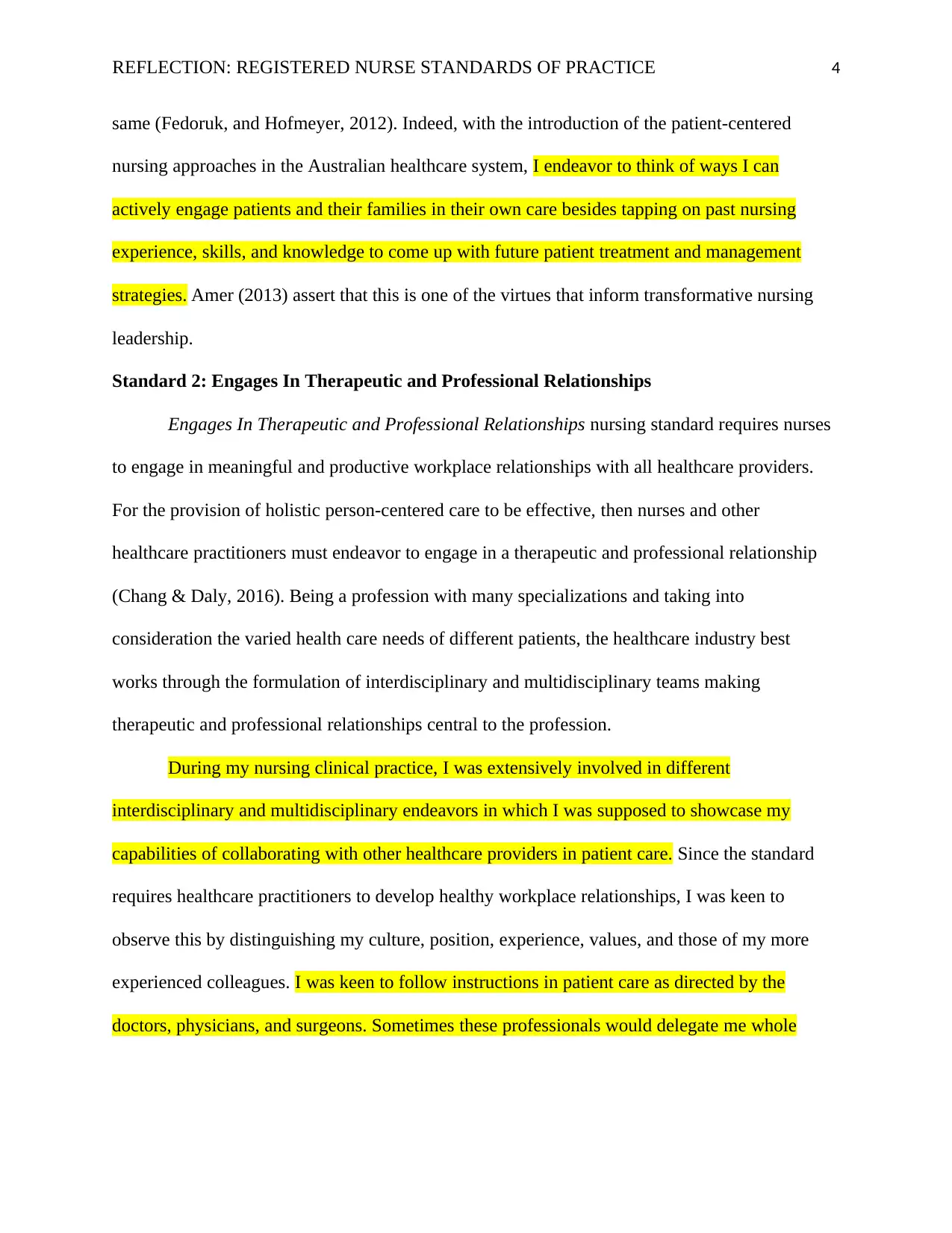
REFLECTION: REGISTERED NURSE STANDARDS OF PRACTICE 4
same (Fedoruk, and Hofmeyer, 2012). Indeed, with the introduction of the patient-centered
nursing approaches in the Australian healthcare system, I endeavor to think of ways I can
actively engage patients and their families in their own care besides tapping on past nursing
experience, skills, and knowledge to come up with future patient treatment and management
strategies. Amer (2013) assert that this is one of the virtues that inform transformative nursing
leadership.
Standard 2: Engages In Therapeutic and Professional Relationships
Engages In Therapeutic and Professional Relationships nursing standard requires nurses
to engage in meaningful and productive workplace relationships with all healthcare providers.
For the provision of holistic person-centered care to be effective, then nurses and other
healthcare practitioners must endeavor to engage in a therapeutic and professional relationship
(Chang & Daly, 2016). Being a profession with many specializations and taking into
consideration the varied health care needs of different patients, the healthcare industry best
works through the formulation of interdisciplinary and multidisciplinary teams making
therapeutic and professional relationships central to the profession.
During my nursing clinical practice, I was extensively involved in different
interdisciplinary and multidisciplinary endeavors in which I was supposed to showcase my
capabilities of collaborating with other healthcare providers in patient care. Since the standard
requires healthcare practitioners to develop healthy workplace relationships, I was keen to
observe this by distinguishing my culture, position, experience, values, and those of my more
experienced colleagues. I was keen to follow instructions in patient care as directed by the
doctors, physicians, and surgeons. Sometimes these professionals would delegate me whole
same (Fedoruk, and Hofmeyer, 2012). Indeed, with the introduction of the patient-centered
nursing approaches in the Australian healthcare system, I endeavor to think of ways I can
actively engage patients and their families in their own care besides tapping on past nursing
experience, skills, and knowledge to come up with future patient treatment and management
strategies. Amer (2013) assert that this is one of the virtues that inform transformative nursing
leadership.
Standard 2: Engages In Therapeutic and Professional Relationships
Engages In Therapeutic and Professional Relationships nursing standard requires nurses
to engage in meaningful and productive workplace relationships with all healthcare providers.
For the provision of holistic person-centered care to be effective, then nurses and other
healthcare practitioners must endeavor to engage in a therapeutic and professional relationship
(Chang & Daly, 2016). Being a profession with many specializations and taking into
consideration the varied health care needs of different patients, the healthcare industry best
works through the formulation of interdisciplinary and multidisciplinary teams making
therapeutic and professional relationships central to the profession.
During my nursing clinical practice, I was extensively involved in different
interdisciplinary and multidisciplinary endeavors in which I was supposed to showcase my
capabilities of collaborating with other healthcare providers in patient care. Since the standard
requires healthcare practitioners to develop healthy workplace relationships, I was keen to
observe this by distinguishing my culture, position, experience, values, and those of my more
experienced colleagues. I was keen to follow instructions in patient care as directed by the
doctors, physicians, and surgeons. Sometimes these professionals would delegate me whole
Paraphrase This Document
Need a fresh take? Get an instant paraphrase of this document with our AI Paraphraser
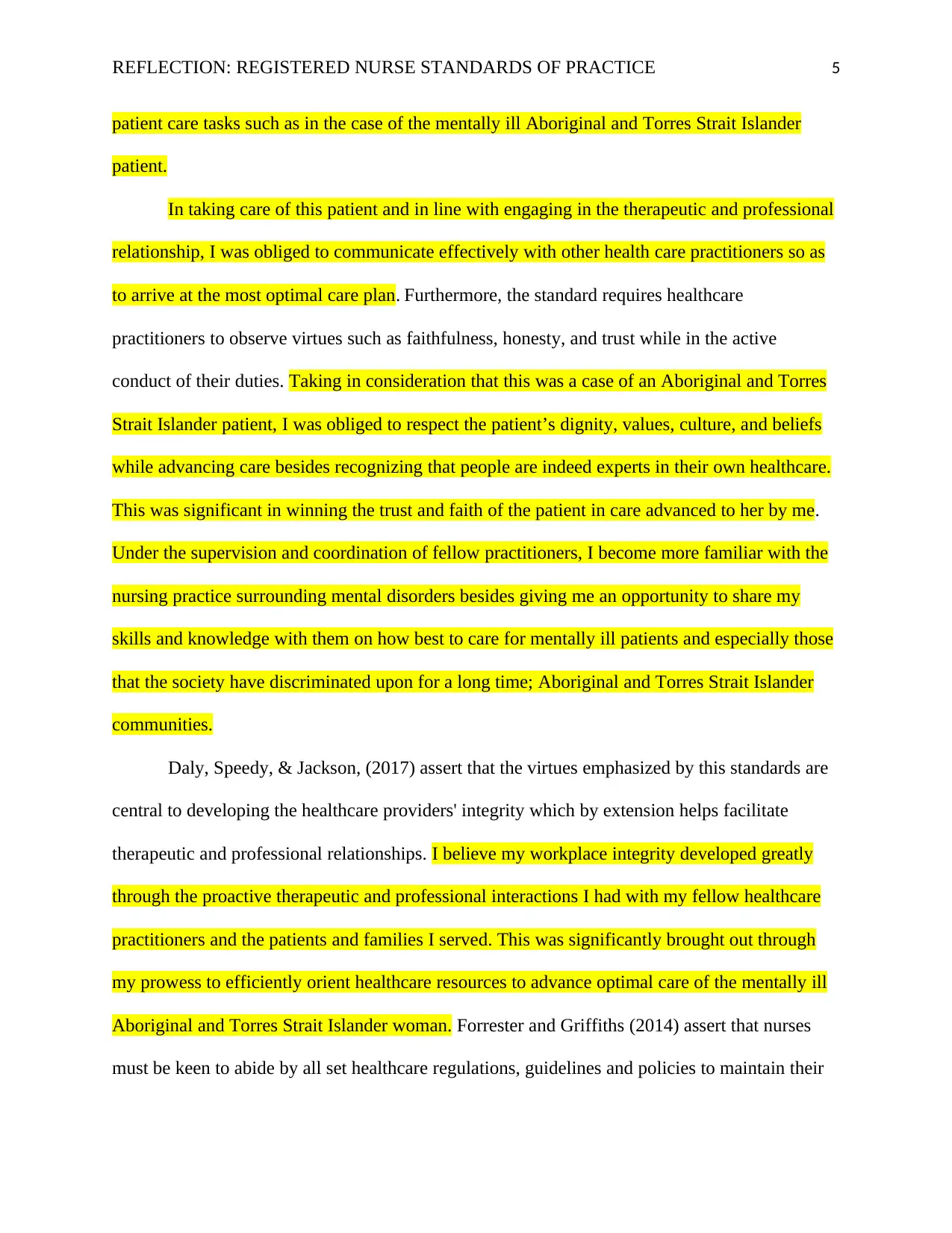
REFLECTION: REGISTERED NURSE STANDARDS OF PRACTICE 5
patient care tasks such as in the case of the mentally ill Aboriginal and Torres Strait Islander
patient.
In taking care of this patient and in line with engaging in the therapeutic and professional
relationship, I was obliged to communicate effectively with other health care practitioners so as
to arrive at the most optimal care plan. Furthermore, the standard requires healthcare
practitioners to observe virtues such as faithfulness, honesty, and trust while in the active
conduct of their duties. Taking in consideration that this was a case of an Aboriginal and Torres
Strait Islander patient, I was obliged to respect the patient’s dignity, values, culture, and beliefs
while advancing care besides recognizing that people are indeed experts in their own healthcare.
This was significant in winning the trust and faith of the patient in care advanced to her by me.
Under the supervision and coordination of fellow practitioners, I become more familiar with the
nursing practice surrounding mental disorders besides giving me an opportunity to share my
skills and knowledge with them on how best to care for mentally ill patients and especially those
that the society have discriminated upon for a long time; Aboriginal and Torres Strait Islander
communities.
Daly, Speedy, & Jackson, (2017) assert that the virtues emphasized by this standards are
central to developing the healthcare providers' integrity which by extension helps facilitate
therapeutic and professional relationships. I believe my workplace integrity developed greatly
through the proactive therapeutic and professional interactions I had with my fellow healthcare
practitioners and the patients and families I served. This was significantly brought out through
my prowess to efficiently orient healthcare resources to advance optimal care of the mentally ill
Aboriginal and Torres Strait Islander woman. Forrester and Griffiths (2014) assert that nurses
must be keen to abide by all set healthcare regulations, guidelines and policies to maintain their
patient care tasks such as in the case of the mentally ill Aboriginal and Torres Strait Islander
patient.
In taking care of this patient and in line with engaging in the therapeutic and professional
relationship, I was obliged to communicate effectively with other health care practitioners so as
to arrive at the most optimal care plan. Furthermore, the standard requires healthcare
practitioners to observe virtues such as faithfulness, honesty, and trust while in the active
conduct of their duties. Taking in consideration that this was a case of an Aboriginal and Torres
Strait Islander patient, I was obliged to respect the patient’s dignity, values, culture, and beliefs
while advancing care besides recognizing that people are indeed experts in their own healthcare.
This was significant in winning the trust and faith of the patient in care advanced to her by me.
Under the supervision and coordination of fellow practitioners, I become more familiar with the
nursing practice surrounding mental disorders besides giving me an opportunity to share my
skills and knowledge with them on how best to care for mentally ill patients and especially those
that the society have discriminated upon for a long time; Aboriginal and Torres Strait Islander
communities.
Daly, Speedy, & Jackson, (2017) assert that the virtues emphasized by this standards are
central to developing the healthcare providers' integrity which by extension helps facilitate
therapeutic and professional relationships. I believe my workplace integrity developed greatly
through the proactive therapeutic and professional interactions I had with my fellow healthcare
practitioners and the patients and families I served. This was significantly brought out through
my prowess to efficiently orient healthcare resources to advance optimal care of the mentally ill
Aboriginal and Torres Strait Islander woman. Forrester and Griffiths (2014) assert that nurses
must be keen to abide by all set healthcare regulations, guidelines and policies to maintain their
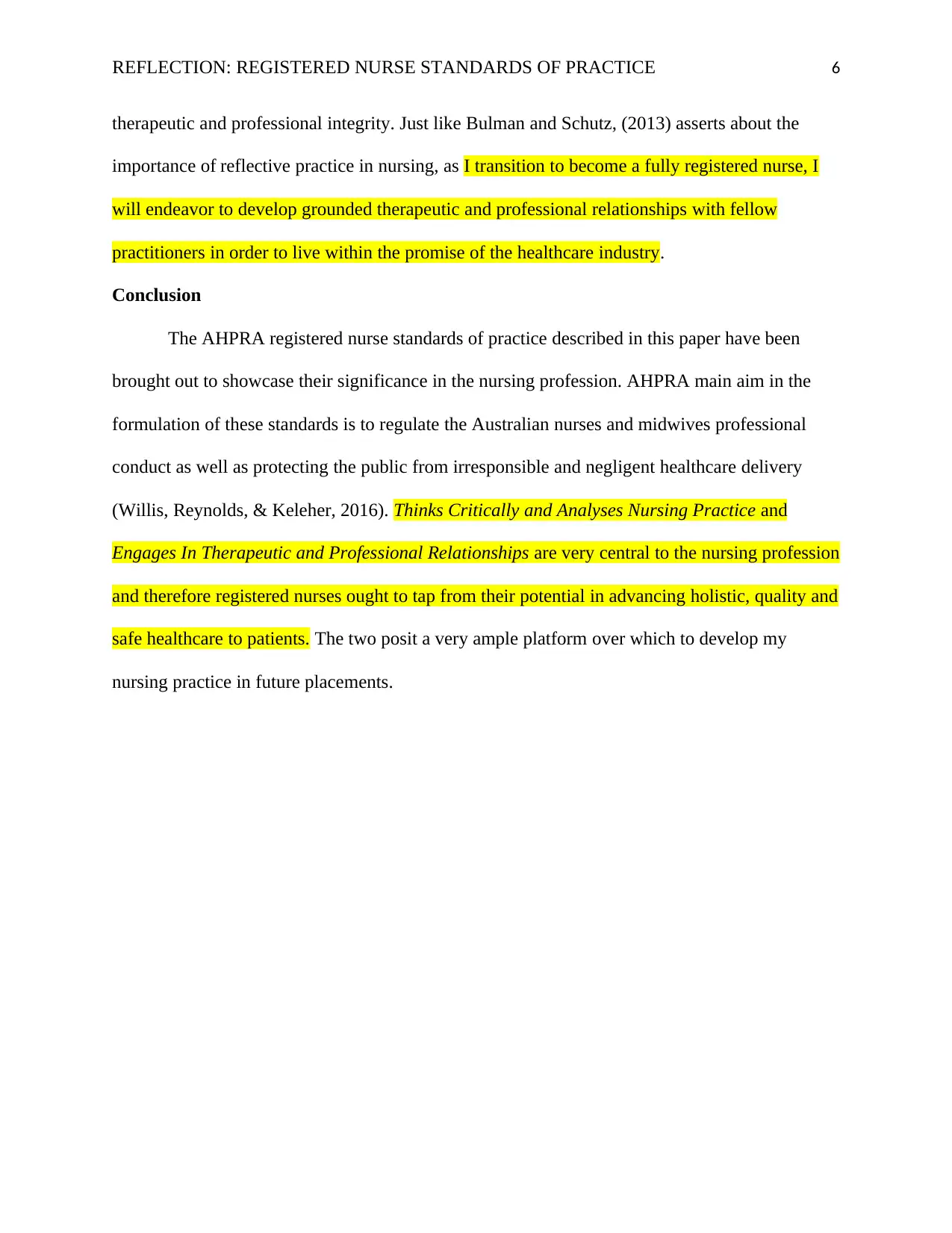
REFLECTION: REGISTERED NURSE STANDARDS OF PRACTICE 6
therapeutic and professional integrity. Just like Bulman and Schutz, (2013) asserts about the
importance of reflective practice in nursing, as I transition to become a fully registered nurse, I
will endeavor to develop grounded therapeutic and professional relationships with fellow
practitioners in order to live within the promise of the healthcare industry.
Conclusion
The AHPRA registered nurse standards of practice described in this paper have been
brought out to showcase their significance in the nursing profession. AHPRA main aim in the
formulation of these standards is to regulate the Australian nurses and midwives professional
conduct as well as protecting the public from irresponsible and negligent healthcare delivery
(Willis, Reynolds, & Keleher, 2016). Thinks Critically and Analyses Nursing Practice and
Engages In Therapeutic and Professional Relationships are very central to the nursing profession
and therefore registered nurses ought to tap from their potential in advancing holistic, quality and
safe healthcare to patients. The two posit a very ample platform over which to develop my
nursing practice in future placements.
therapeutic and professional integrity. Just like Bulman and Schutz, (2013) asserts about the
importance of reflective practice in nursing, as I transition to become a fully registered nurse, I
will endeavor to develop grounded therapeutic and professional relationships with fellow
practitioners in order to live within the promise of the healthcare industry.
Conclusion
The AHPRA registered nurse standards of practice described in this paper have been
brought out to showcase their significance in the nursing profession. AHPRA main aim in the
formulation of these standards is to regulate the Australian nurses and midwives professional
conduct as well as protecting the public from irresponsible and negligent healthcare delivery
(Willis, Reynolds, & Keleher, 2016). Thinks Critically and Analyses Nursing Practice and
Engages In Therapeutic and Professional Relationships are very central to the nursing profession
and therefore registered nurses ought to tap from their potential in advancing holistic, quality and
safe healthcare to patients. The two posit a very ample platform over which to develop my
nursing practice in future placements.
⊘ This is a preview!⊘
Do you want full access?
Subscribe today to unlock all pages.

Trusted by 1+ million students worldwide
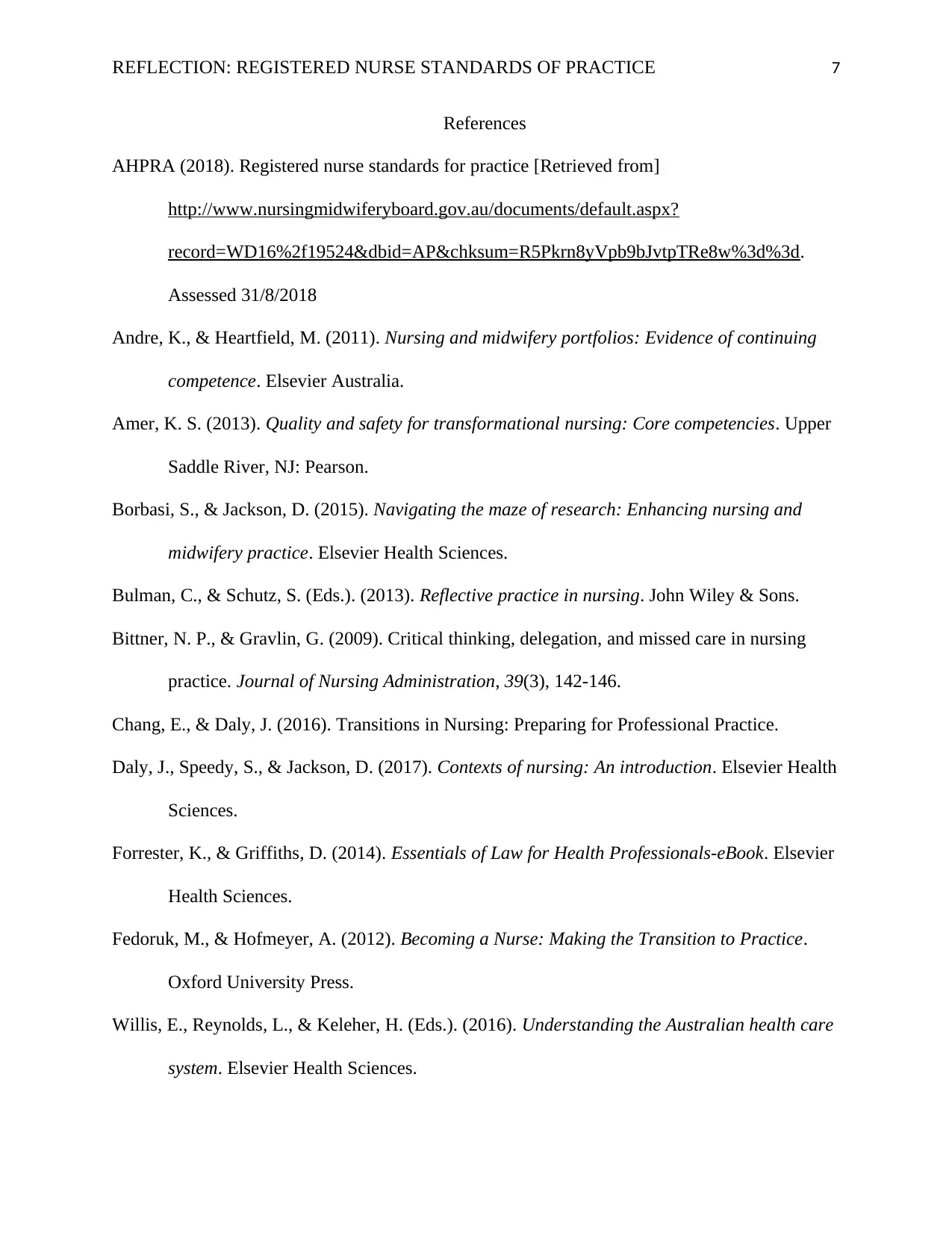
REFLECTION: REGISTERED NURSE STANDARDS OF PRACTICE 7
References
AHPRA (2018). Registered nurse standards for practice [Retrieved from]
http://www.nursingmidwiferyboard.gov.au/documents/default.aspx?
record=WD16%2f19524&dbid=AP&chksum=R5Pkrn8yVpb9bJvtpTRe8w%3d%3d.
Assessed 31/8/2018
Andre, K., & Heartfield, M. (2011). Nursing and midwifery portfolios: Evidence of continuing
competence. Elsevier Australia.
Amer, K. S. (2013). Quality and safety for transformational nursing: Core competencies. Upper
Saddle River, NJ: Pearson.
Borbasi, S., & Jackson, D. (2015). Navigating the maze of research: Enhancing nursing and
midwifery practice. Elsevier Health Sciences.
Bulman, C., & Schutz, S. (Eds.). (2013). Reflective practice in nursing. John Wiley & Sons.
Bittner, N. P., & Gravlin, G. (2009). Critical thinking, delegation, and missed care in nursing
practice. Journal of Nursing Administration, 39(3), 142-146.
Chang, E., & Daly, J. (2016). Transitions in Nursing: Preparing for Professional Practice.
Daly, J., Speedy, S., & Jackson, D. (2017). Contexts of nursing: An introduction. Elsevier Health
Sciences.
Forrester, K., & Griffiths, D. (2014). Essentials of Law for Health Professionals-eBook. Elsevier
Health Sciences.
Fedoruk, M., & Hofmeyer, A. (2012). Becoming a Nurse: Making the Transition to Practice.
Oxford University Press.
Willis, E., Reynolds, L., & Keleher, H. (Eds.). (2016). Understanding the Australian health care
system. Elsevier Health Sciences.
References
AHPRA (2018). Registered nurse standards for practice [Retrieved from]
http://www.nursingmidwiferyboard.gov.au/documents/default.aspx?
record=WD16%2f19524&dbid=AP&chksum=R5Pkrn8yVpb9bJvtpTRe8w%3d%3d.
Assessed 31/8/2018
Andre, K., & Heartfield, M. (2011). Nursing and midwifery portfolios: Evidence of continuing
competence. Elsevier Australia.
Amer, K. S. (2013). Quality and safety for transformational nursing: Core competencies. Upper
Saddle River, NJ: Pearson.
Borbasi, S., & Jackson, D. (2015). Navigating the maze of research: Enhancing nursing and
midwifery practice. Elsevier Health Sciences.
Bulman, C., & Schutz, S. (Eds.). (2013). Reflective practice in nursing. John Wiley & Sons.
Bittner, N. P., & Gravlin, G. (2009). Critical thinking, delegation, and missed care in nursing
practice. Journal of Nursing Administration, 39(3), 142-146.
Chang, E., & Daly, J. (2016). Transitions in Nursing: Preparing for Professional Practice.
Daly, J., Speedy, S., & Jackson, D. (2017). Contexts of nursing: An introduction. Elsevier Health
Sciences.
Forrester, K., & Griffiths, D. (2014). Essentials of Law for Health Professionals-eBook. Elsevier
Health Sciences.
Fedoruk, M., & Hofmeyer, A. (2012). Becoming a Nurse: Making the Transition to Practice.
Oxford University Press.
Willis, E., Reynolds, L., & Keleher, H. (Eds.). (2016). Understanding the Australian health care
system. Elsevier Health Sciences.
Paraphrase This Document
Need a fresh take? Get an instant paraphrase of this document with our AI Paraphraser
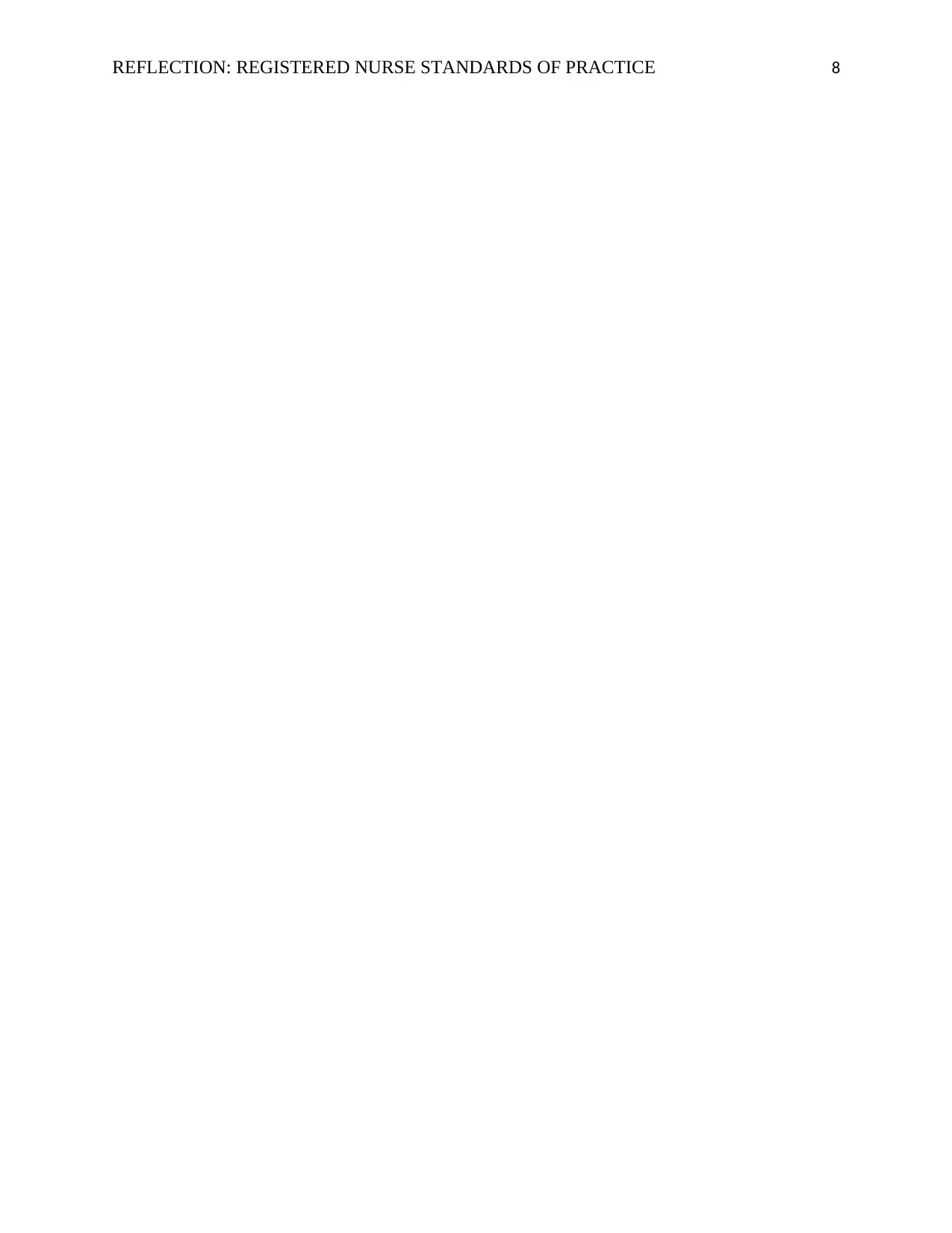
REFLECTION: REGISTERED NURSE STANDARDS OF PRACTICE 8
1 out of 8
Related Documents
Your All-in-One AI-Powered Toolkit for Academic Success.
+13062052269
info@desklib.com
Available 24*7 on WhatsApp / Email
![[object Object]](/_next/static/media/star-bottom.7253800d.svg)
Unlock your academic potential
Copyright © 2020–2026 A2Z Services. All Rights Reserved. Developed and managed by ZUCOL.





